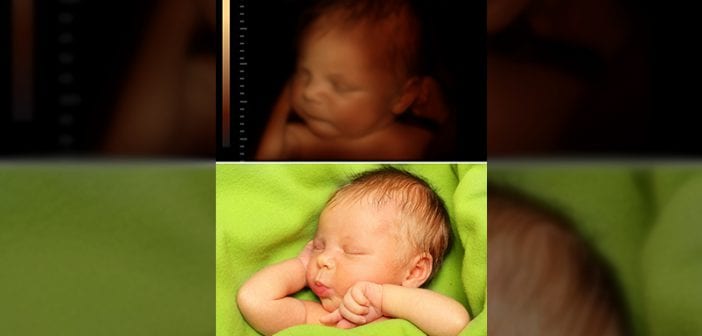As understanding of fetal development advances, scientists find more cognitive function and nervous system development than previous generations might have thought possible. We already know that babies can undeniably feel pain by 20 weeks gestation, a fact that has advanced important Pro-Life protections for many preborn babies. We have also seen evidence that humans begin learning about language, food, and culture before they are born. A new study from the Netherlands confirms that babies in the womb demonstrate short-term memory by 30 weeks.
The study published in the July/August 2009 issue of Child Development shows the findings of researchers at Maastricht University Medical Centre and the University Medical Centre St. Radboud in the Netherlands. For the experiment, researchers worked with 100 healthy pregnant mothers and their babies. Over the course of the study, they measured how the preborn babies reacted to repeated stimuli. Observing the babies react via ultrasound, the researchers showed that preborn babies showed “habituation” after being exposed to the same stimulus several times. In other words, once the babies learned that the stimulus was “safe,” they no longer responded to the repetition of the same stimulus. This learned response shows that babies can form short-term memory, thus learning in the womb. We’ve long known that babies learn before birth, but the precise timeline and capacity is still little understood.
Perhaps the most amazing aspect of the study is how long babies stored these memories. The preborn babies were tested at 30 weeks, at which time they demonstrated they could maintain short-term memory for 10 minutes. Science Daily explains, “They [the researchers]determined this because a significantly lower number of stimuli was needed to reach habituation in a second session, which was performed 10 minutes after the first session.” Interestingly, at 34 weeks, a preborn baby demonstrates that he or she can retrieve information stored four weeks before. Again, Science Daily elaborates:
Fetuses were tested at 30, 32, 34, and 36 weeks, and again at 38 weeks. The 34- and 36-week-old fetuses habituated much faster than the 38-week-old fetuses that had not been tested before. This implies that these fetuses have a memory of at least 4 weeks—the interval between the test at 34 weeks and that at 38 weeks.
Ongoing research of fetal development continues to demonstrate the continuity between preborn babies and newborns. The most complex cognitive functions of newborn babies likely begin before birth, and researchers are now beginning to understand when and how. The growing body of evidence about fetal development shows the humanity of the preborn. The undeniable humanity of the preborn is the reason why the abortion industry will not challenge the 20 week ban which protects pain-capable babies from the horrific violence of abortion.
The Pro-Life movement endeavors to protect ALL preborn babies from abortion. As we understand more about fetal development and the reality of abortion, the public case against abortion is growing and the humanity of the preborn cannot be doubted.

